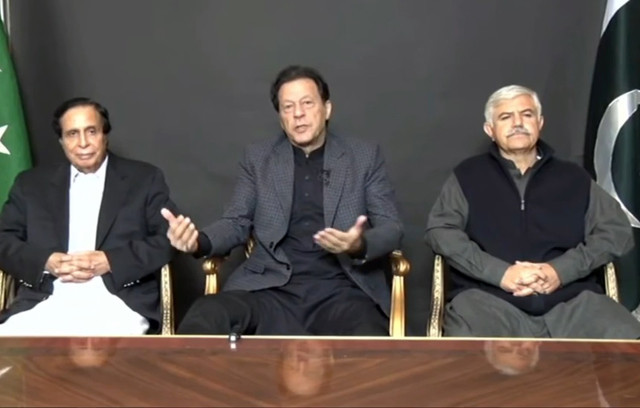
The constitutional crisis may deepen in Punjab as Governor Balighur Rehman, who belongs to the PML-N, is considering de-notifying Chief Minister Pervaiz Elahi, a PML-Q stalwart, after the latter’s failure to take a vote of confidence in accordance with Article 130(7) of the Constitution.
In case of de-notification, Elahi will continue to work until a new chief minister is elected. However, his cabinet members will be sacked.
A senior government functionary disclosed that the governor might change his mind in case of any agreement through back-channel talks. “Our prime objective is that the Punjab Assembly should not be dissolved,” he added.
A senior PTI leader said in case the governor issued a de-notification order, CM Elahi would seek a legal opinion from the advocate general’s office.
“If the advocate general says that the governor's order is illegal, then the chief minister will also reject it,” he added.
On the question about whether or not the PTI would approach the judiciary against the de-notification, the senior leader replied that his party would not move the court. “If they [governor and the opposition in Punjab) want, then they should approach the court,” he said.
It has been learnt that the PTI was facing a shortage of the support of six MPAs in the Punjab Assembly. However, the PTI leaders are claiming that there was no issue of the numbers in the provincial assembly.
Since March, there has been instability in Punjab. First, then Punjab Assembly speaker Elahi was delaying the election of the chief minister. Later, the election was held on directives of the Lahore High Court.
Subsequently, the election result was disputed by the PTI and PML-Q. The then Punjab governor had refused to swear in new chief minister Hamza Shehbaz.
Later, his oath was administered to him by National Assembly Speaker Raja Pervez Ashraf on the LHC’s directives.
In May, the Supreme Court majority judgment had held that votes of defecting lawmakers would not be counted as it was a violation of Article 63 (A) of the Constitution.
Legal experts term this SC ruling as the worst judgement of this year wherein the Constitution was re-written by three judges.
Even two members of the bench had opposed their opinion.
Subsequently, the Election Commission of Pakistan (ECP) had de-seated defecting lawmakers of the PTI.
Before the by-elections, the apex court intervened again on a PTI plea.
A schedule was issued for the holding of the election for the chief minister after the by-polls.
The PTI managed to bag the majority of the seats in the by-elections and it was able to elect Elahi as the new chief minister.
Now, PTI chairman and deposed premier Imran Khan has announced dissolving the Punjab Assembly on December 23.
It is an open secret that CM Elahi does not want the dissolution of the assembly because of certain reasons.
However, he conditionally agreed with the PTI to dissolve assembly.
Currently, negotiations are under way between the PTI and PML-Q for a seat adjustment formula for the next general elections in Punjab.
Legal experts said the crisis in Punjab could be resolved through political dialogue.
They added that the superior courts’ intervention was not a permanent solution.
The PML-N should consider the option of holding general elections.
Similarly, Imran should also think about what kind of precedent was being set by his party.
He could have waited for the general elections, which were due to be held next year.
Several PML-N lawyers said the PTI chief was in a hurry to avoid his disqualification.
Political analysts said the PTI had so far failed to maintain a cordial relationship with the powerful circles, who also did not want the dissolution of any assembly -- as revealed by CM Elahi in a recent interview.
A PTI leader disclosed that Elahi had suggested that the Imran-led party should not dissolve the assembly immediately and try to resume the cordial ties with the powerful circles like the ones it had before the 2018 general elections.
PTI leader Fawad Chaudhry said in case of any illegal action, the president might initiate action against governor.
However, constitutional expert Chaudhry Aitzaz Ahsan said the president had no authority to take action against the governor.














1661056641-0/image-(1)1661056641-0-270x192.webp)






COMMENTS
Comments are moderated and generally will be posted if they are on-topic and not abusive.
For more information, please see our Comments FAQ